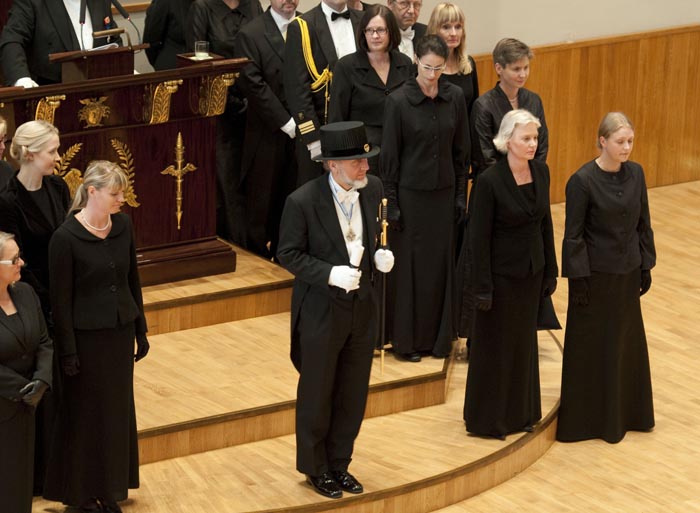Prof. Hans-Werner Sinn has received an honorary doctorate from the University of Helsinki.
The President of the Ifo Institute for Economic Research and Professor of Economics and Public Finance at the University of Munich was presented with the sword and doctoral hat of the University of Helsinki at the traditional conferment ceremony. In the laudation, Prof. Seppo Hentilä stressed the importance of Hans-Werner Sinn’s role not only as one of the most prominent economists world-wide but also as an influential economic-policy advisor. His book, Ist Deutschland noch zu retten?, published in 2003 and subsequently in English by MIT Press as Can Germany be Saved? has reached a broad readership unmatched by most economic-policy monographs. Already in 1999, Prof. Sinn was awarded an honorary doctorate from the University of Magdeburg.

Report by the University of Helsinki:
This was no run-of-the-mill honorary doctorate; those are awarded yearly by the University of Helsinki. This was a “conferment”, a far more special event that runs over three days. Held only once every five years, it is the highest honour the university bestows, one of the finest ceremonies in the country, and is part of a tradition that has been upheld nearly unchanged for almost four centuries. More than just a degree-awarding ceremony, this is a grand academic celebration.
A dozen personalities from various disciplines and countries were chosen for the distinction on this occasion, including Paavo Lipponen, a former Finnish Prime Minister. Hans-Werner Sinn was the one chosen by the Faculty of Economics. The honorary doctors, who must all wear tailcoats, are given a special hat and a sword, which they have to whet themselves at a huge grindstone, after rehearsing the Conferment Act. The grindstone is turned by escorts and repeatedly glazed with sparkling wine, “the liquid manifestation of the spirit of the Conferment Ceremony”, in order to “guarantee the success of the whetting”, according to the written instructions for the event.
The Conferment Act itself begins with a celebratory procession headed by the honorary doctors and consisting of the promovendi, the escorts and their guests. During the act, degrees are awarded to the new doctors, the honorary doctors—and also to the jubilee doctors, honorary and otherwise, who received their degrees fifty years ago. Among the several speeches, one is quite special: a jubilee doctor delivers a message that has been repeated by such awardees since the dawn of the country.
After the Act, the attendees emerge from the ceremonial hall as a small procession onto the town square walking on a red carpet, church bells ringing and people lining the streets with cameras, and head for the Helsinki Cathedral for a religious service.
The activities include a sailing trip on traditional sailboats. On the last day, the Conferment Ball features the Master’s contredanse française and the doctoral polonaise. Come midnight, the Conferrer of Degrees is ceremonially invited to leave through a tunnel of swords, in order for the party to really get started. But the night is far from over. There is still a nocturnal procession around Helsinki, complete with speeches and surprises, paying homage to the statues of various Finnish poets and other grandees. The procession ends at daybreak (this being Finland in late Spring, somewhere around 4 am), where the revelers greet the sun and hear a speech. Then they head for a breakfast.
The laudation upon bestowing this honour upon Prof. Sinn said, in part, “You are one of the most renowned economists in the world and also an important economic policy advisor. Your book “Ist Deutschland noch zu retten?”, published in English as “Can Germany Be Saved?”, reached such a broad readership that scarcely another economic policy book can compete with it.”
Further details are available on the University of Helsinki website